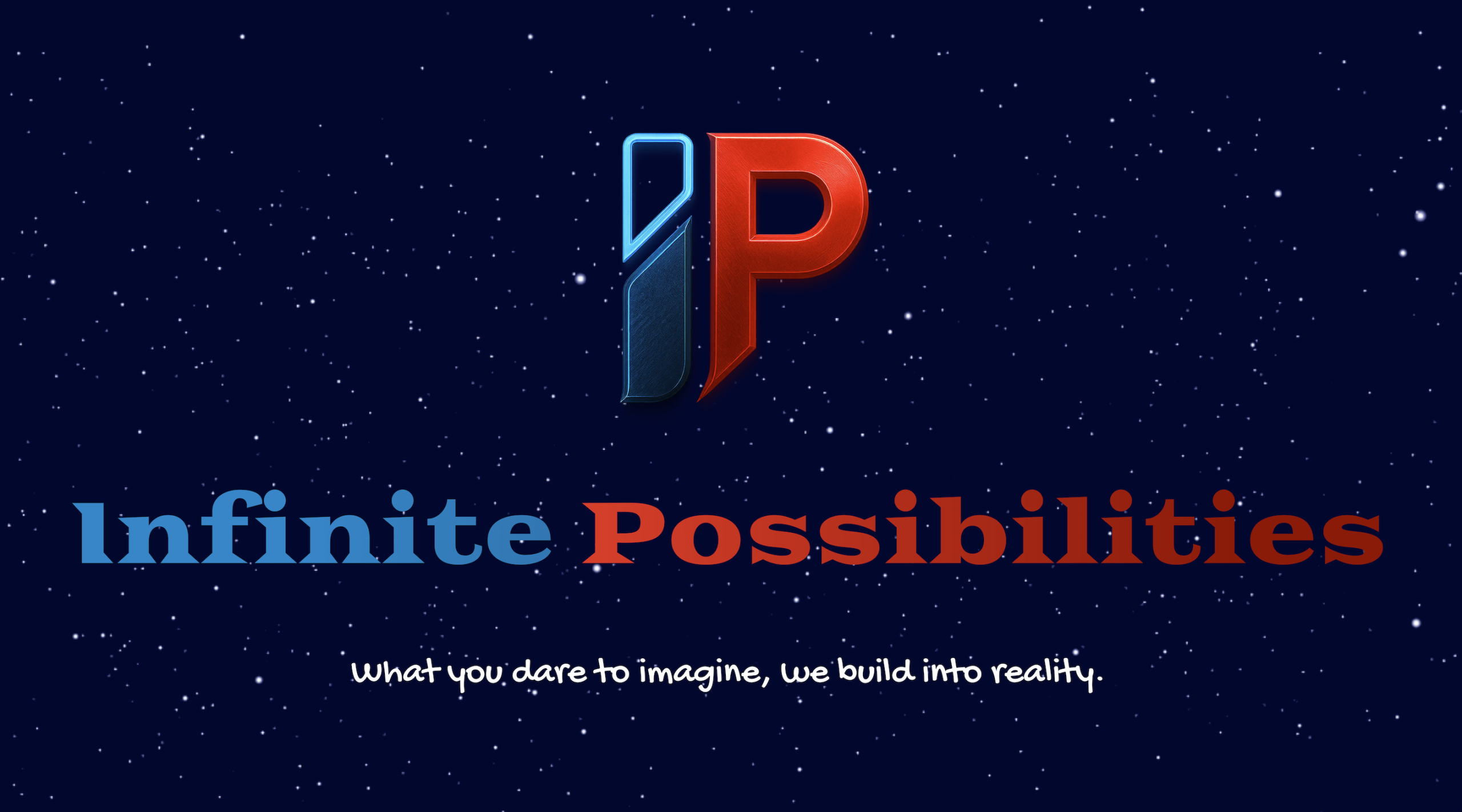Zircuit is a modular ZK rollup with AI-enabled security at the sequencer level. It attracts capital flows into the platform by encouraging the community to deposit trending assets such as LST, LRT, and USDe to earn points and qualify for airdrops.
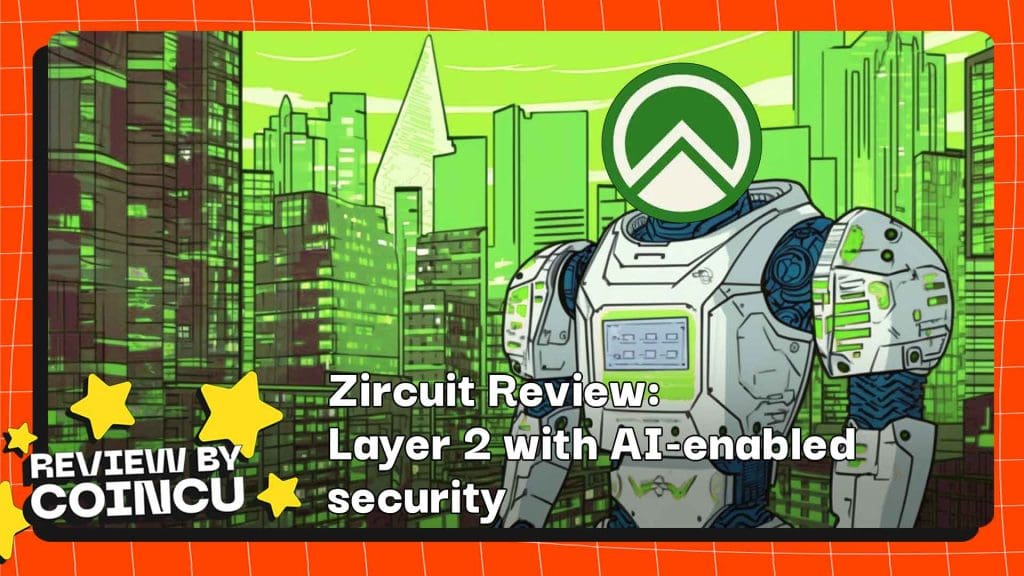
What is Zircuit?
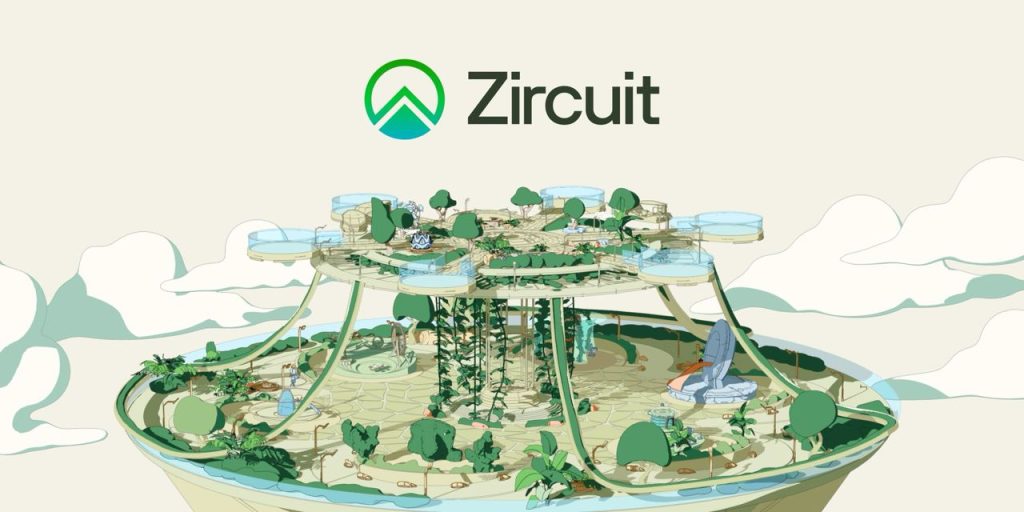
Zircuit is a project of Layer 2, based on the ZK-Rollups model, completely compatible with the EVM. With the results of this thorough research in Layer 2, the project was created by combining the benefits of Optimistic rollup infrastructure and Zero Knowledge Proof.
With this combination, this project intends to provide optimum support for developers. Moreover, the model Sequencer Level Security enables the best performance and security so that the user can use Zircuit for fast transactions with low gas fees and high safety.
Read More: Renzo Review: Binance Labs Backed Cross-chain Liquid Restaking Protocol
Main feature of Zircuit
- Pioneering Research: The Zircuit project leads research on Rollup Security Tooling, Rollup Compression, and Scaling Cryptography, receiving support from the Ethereum Foundation.
- Sequencer-Level Security: Zircuit safeguards users at the sequencer operation level by monitoring the mempool for manipulated transactions. It addresses core issues directly rather than focusing on dapp and smart contract operation challenges.
- Secure native bridge: Zircuit’s cross-chain bridge integrates top-tier security architectures while prioritizing user experience.
- Performance: Zircuit enhances efficiency and reduces operational costs by breaking circuits into specialized parts and synthesizing proofs.
- Hybrid Architecture: Zircuit is the first zkEVM on Optimism Bedrock, 100% EVM-compatible. Combines OP architecture with zero-knowledge proofs and AI for security.
- Ethereum Compatibility: Zircuit is compatible with all Ethereum Dapps and supports wallets like MetaMask and tools like Hardhat.
Read More: Puffer Finance Review: Liquid Restaking Protocol Is Invested By Binance Labs
Products of Zircuit

Zircuit is an L2 zkEVM written in the Solidity programming language; hence, the dApps on the EVM Chain could port over to Zircuit without requiring the original code to change.
The initiative has also come up with a native Bridge called the Canonical Bridge to facilitate the movement of the ERC-20 asset types from Ethereum to Zircuit. Sequencers on L2 Zircuit, who double as Validators of Geth, will validate the transactions on the Canonical Bridge.
Tokenomics and Use Case
Currently, there is no official information available regarding the project’s tokenomics.
Team and Investors
Team

Jan is a co-founder of Zircuit and an expert in algorithm design and formal methods. Passionate about rollups, plasma, and related tech, he does research on sequencer-level security, time of proof generation, and zero knowledge circuit verification at Zircuit. Jan also spearheads L2 Scaling at Quantstamp and graduated with a Ph.D. in Computer Science from the University of Waterloo in 2022.
Holds a Bachelor’s degree in Economics from Columbia University and boasts a diverse work experience, having served as an analyst at Bank of America Merrill Lynch, co-founded Taker Protocol, and contributed to developing the Quantstamp ecosystem.

Dr. Martin Derka is a blockchain expert with notable work in smart contracts and platforms built with Ethereum. Specializing in DeFi, he enhances security and mitigates economic manipulations. As a co-founder of Zircuit, he’s worked on advanced scaling and privacy in blockchain. His leadership in rollup solutions makes him one of the key influencers in the Ethereum ecosystem.
Investor and partners

The Zircuit project has secured investments from renowned funds like Pantera Capital and Dragonfly Capital, as well as support from liquid staking projects, including EigenLayer, Kelp DAO, Renzo, and Lido.
Roadmap
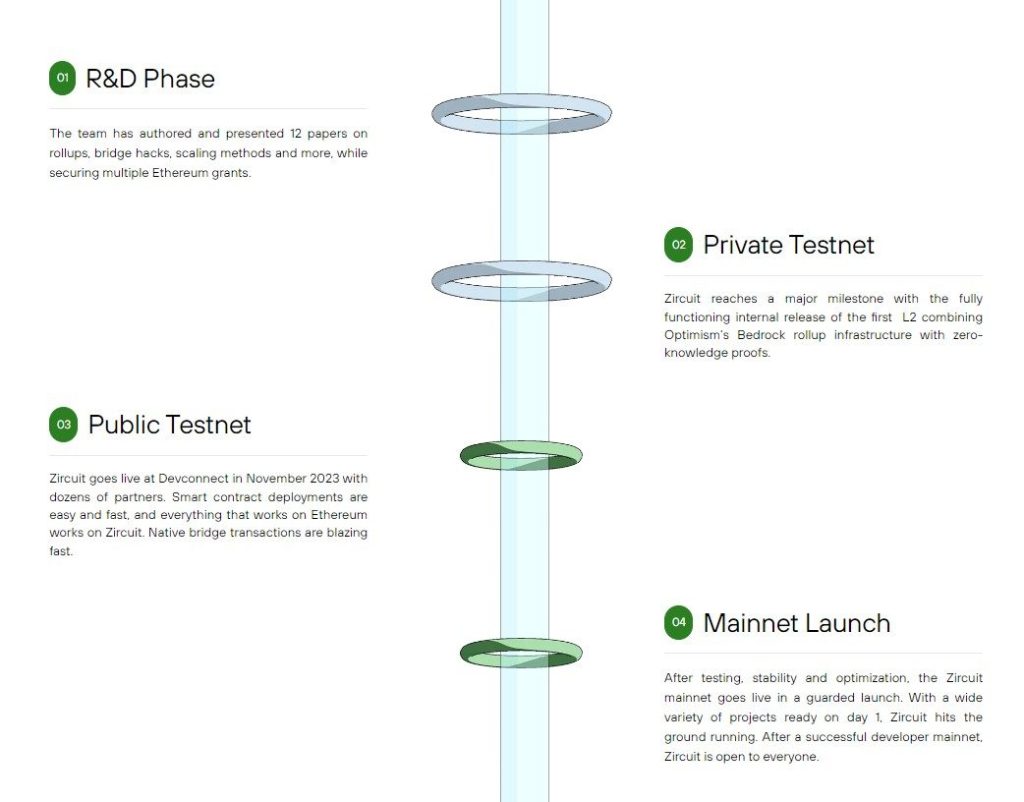
- R&D Phase: The team has authored and presented 12 papers on rollups, bridge hacks, scaling methods, and more. They have also secured multiple Ethereum grants.
- Private Testnet: Zircuit achieves a significant milestone with the successful internal release of L2, which integrates Optimism’s Bedrock rollup infrastructure with zero-knowledge proofs.
- Public Testnet: With numerous partners, zircuit will launch at Devconnect in November 2023. Deploying smart contracts is quick and seamless, and anything that functions on Ethereum is compatible with Zircuit. Native bridge transactions are exceptionally fast.
- Mainnet Launch: After thorough testing, stability checks, and optimization, the Zircuit mainnet is launched in a highly secure, guarded launch. With a diverse range of projects ready on day one, Zircuit starts strong. Following a successful developer mainnet phase, Zircuit is now accessible to all users.
The project has been in development for some time and is currently in the public testnet stage (Phase 3). All project resources are now directed towards finalizing the platform in preparation for the Mainnet launch in Phase 4.
Guide to hunt airdrop combining Stakestone and Zircuit
Step 1: Visit stakestone.io and connect your wallet
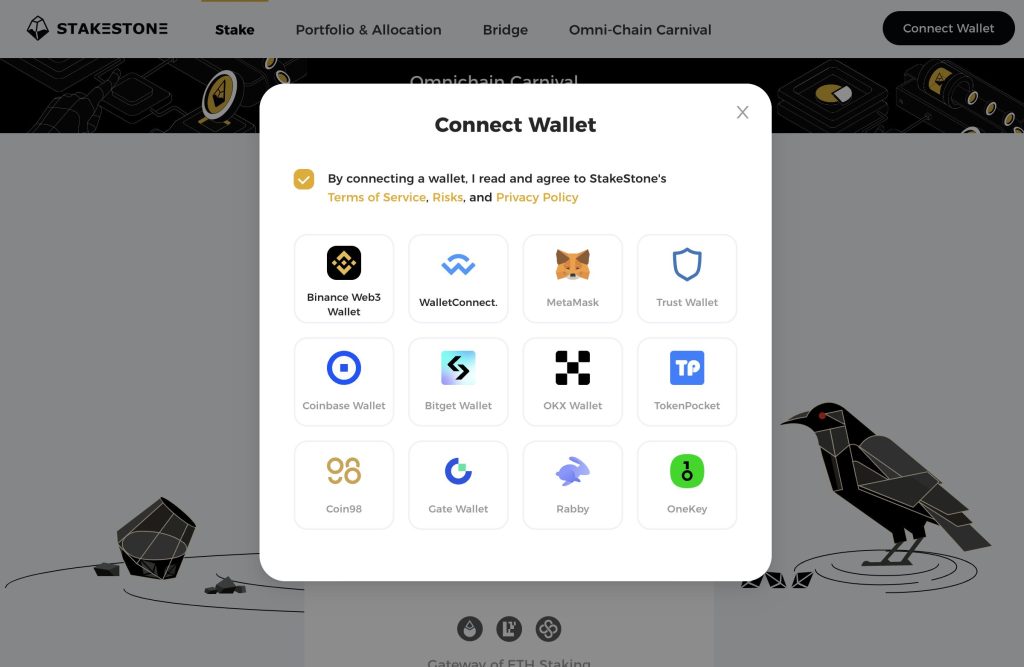
Step 2: Switch to the Ethereum network and enter the amount of ETH you wish to stake.
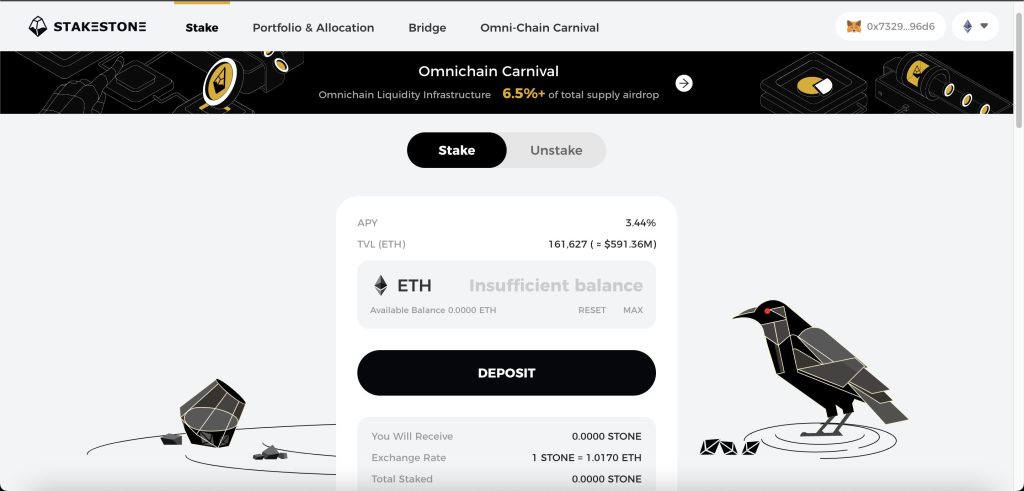
Step 3: Claim cSTONE tokens within 2 to 48 hours
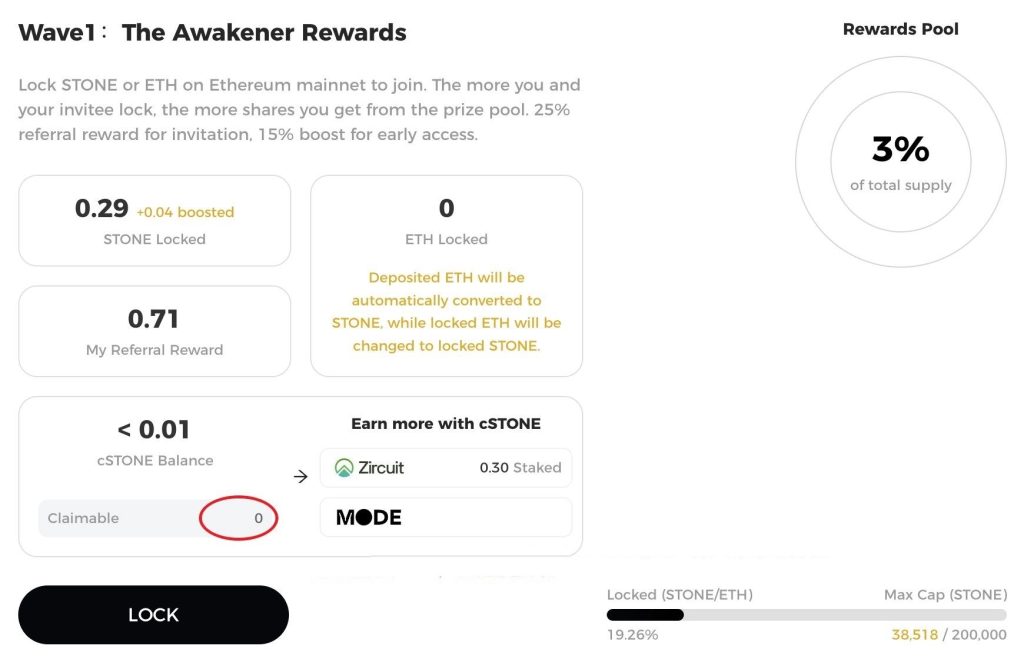
Step 4: Once you have obtained cSTONE, visit stake.zircuit.com and connect your wallet.
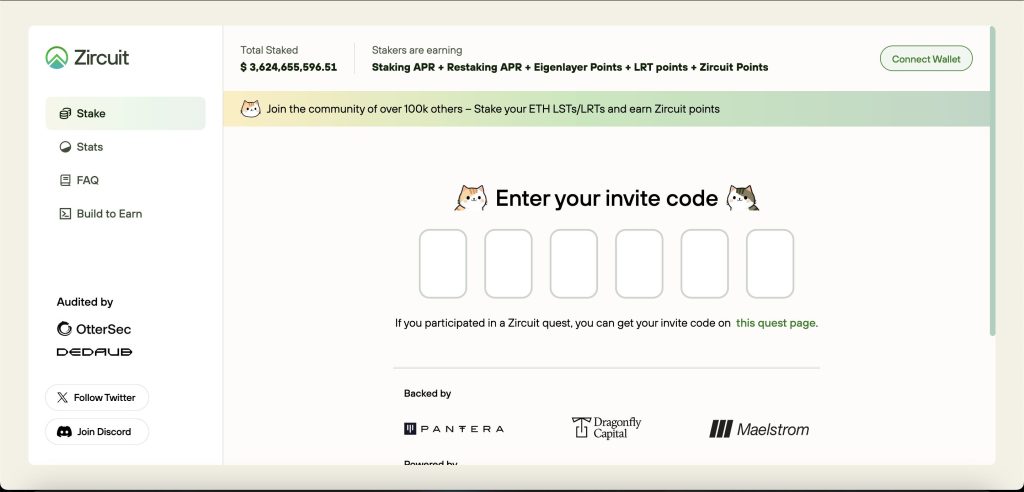
Step 5: Enter your Invite Code.
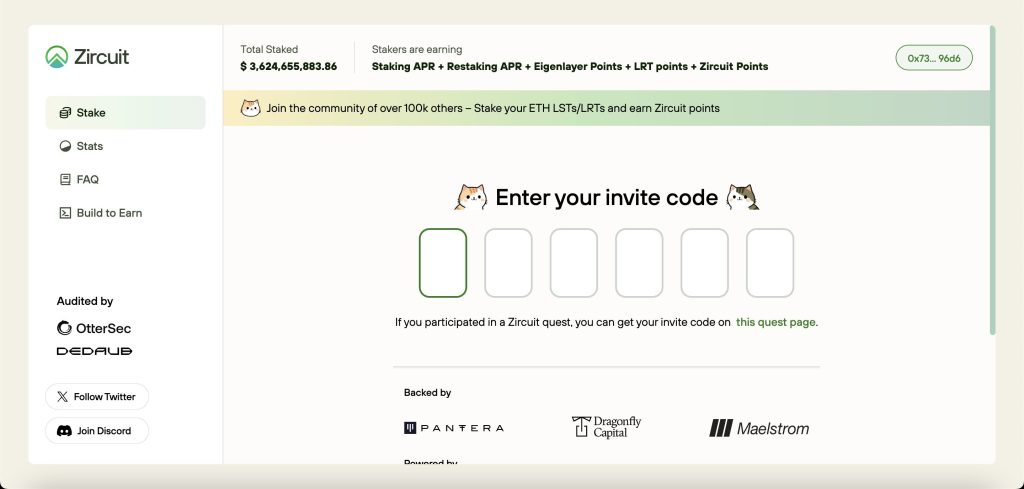
Step 6: Navigate to the Stake section, enter the amount of cSTONE you wish to restake, and click Confirm.
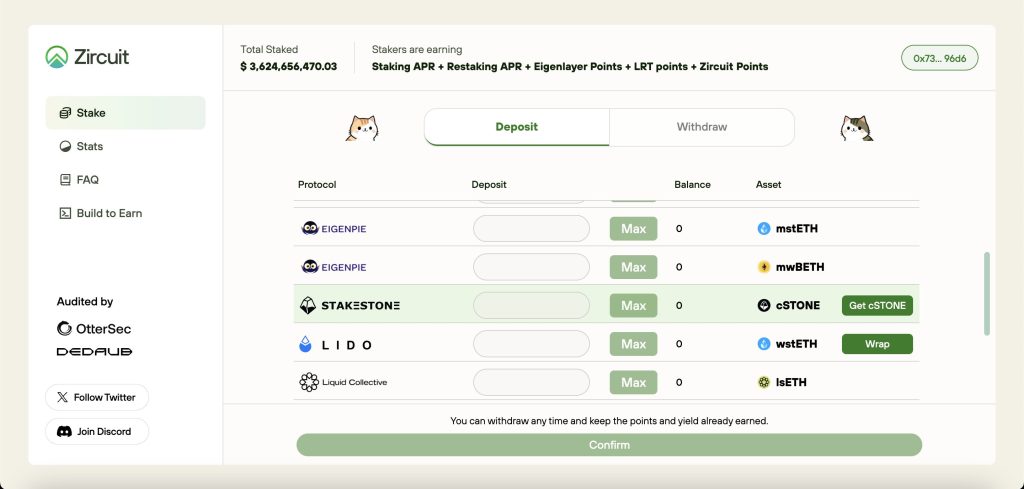
Conclusion
Zircuit is a Layer 2 solution that joins Optimistic Rollups with Zero Knowledge Proof technology in its bid to help developers expand the Ethereum ecosystem.
CoinCu sees this project as promising for airdrop hunting due to the backing of top funds: Pantera, Dragonfly Capital, Maelstrom, and Serafund. The funding amount is undisclosed, but all are from reputable names.
1. What is Zircuit, and how is it different from other Layer 2 solutions?
Zircuit is a Layer 2 using zero-knowledge roll-up technology in conjunction with AI-enabled security. But Zircuit uses AI at the sequencer level in order to detect and prevent malicious transactions, hence improving security in general. It follows a modular architecture where it integrates zero-knowledge proofs with the frameworks of Ethereum; therefore, transactions are faster and cheaper while being compatible with tools and wallets of Ethereum.
2. How does Zircuit’s AI-enabled security work?
Zircuit’s AI-enabled security system, working at the sequencer level, keeps monitoring the mempool constantly to observe the occurrence of malicious activities, such as blacklisted addresses and exploit contracts. Once such activities are detected and confirmed, the AI system prevents these transactions from getting included in the next block, hence maintaining a higher level of security for the blockchain network.
3. What is the Zircuit Staking Program, and what are its advantages?
The Zircuit Staking Program allows users to get the opportunity of staking ETH, LSTs, and LRTs to earn Zircuit Points. These are part of the incentive system designed to enhance user engagement and liquidity. The staking program has quickly accumulated over $2 billion in total value locked, offering users the ability to earn high rewards and be actively involved in the Zircuit ecosystem.
| DISCLAIMER: The information on this website is provided as general market commentary and does not constitute investment advice. We encourage you to do your own research before investing. |












